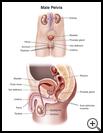
Nonbacterial Prostatitis (Inflammation of the Prostate Gland)
________________________________________________________________________
KEY POINTS
- Nonbacterial prostatitis is swelling and irritation of the prostate that is caused by irritation, blockage, or other problems. It is not caused by bacteria.
- Treatment depends on the cause but often includes medicine.
- Follow the full course of treatment prescribed by your healthcare provider. Get prompt treatment for any urinary tract problems to lower your risk for prostate problems.
________________________________________________________________________
What is nonbacterial prostatitis?
Nonbacterial prostatitis is swelling and irritation (inflammation) of the prostate that is not caused by bacteria. It is the most common type of chronic (long-term) prostatitis.
The prostate gland is part of a man's reproductive system. It is about the size of a walnut and located between the bladder and the penis. The prostate gland surrounds the upper part of the urethra, the tube that carries urine from the bladder out through the penis. It makes fluid that nourishes sperm and helps carry it out of the body during sex.
What is the cause?
The exact cause of nonbacterial prostatitis is not always known. Possible causes may include:
- Blockage in the prostate gland caused by aging or damage from a prostate infection
- Irritation caused by urine flowing back up into the prostate
- Irritation from chemicals, such as soap
- Problems with nerves in the urinary tract
- Problems with muscles in the pelvis
- Sexual abuse
- Parasites and viruses
- Irritation from bicycle riding
What are the symptoms?
Symptoms may include:
- Pain behind your scrotum
- Pain or burning when you urinate
- Urinating more often
- A strong and sudden urge to urinate
- Pain when you have a bowel movement
- Aching in your penis, scrotum, middle to lower belly, or lower back
- Pain during or after the release of semen during sex
- Small amounts of blood in the semen or urine
How is it diagnosed?
Your healthcare provider will ask about your symptoms and examine you. You may have tests such as:
- A rectal exam, which your provider does by gently putting a lubricated and gloved finger in your rectum to feel the prostate gland
- Urine tests
- Tests of fluid from your prostate
You may have tests to check for other possible causes of your symptoms, such as a sexually transmitted disease (STD).
How is it treated?
Sometimes nonbacterial prostatitis responds promptly to treatment, but it is often hard to cure. Symptoms may last for weeks or months or may come and go for years. Your healthcare provider may prescribe medicine to:
- Treat infections not caused by bacteria
- Help relax the muscles around the prostate
- Treat pain and swelling
How can I take care of myself?
Here are some things you can do to help relieve pain and other symptoms:
- Follow the full course of treatment prescribed by your healthcare provider.
- Take nonprescription pain medicine, such as ibuprofen or naproxen. Read the label and take as directed. Nonsteroidal anti-inflammatory medicines (NSAIDs), such as ibuprofen and naproxen, may cause stomach bleeding and other problems. These risks increase with age. Unless recommended by your healthcare provider, you should not take this medicine for more than 10 days.
- Take a warm bath.
- Take a stool softener if constipation is a problem.
- Avoid caffeine, alcohol, and spicy foods.
Ask your provider:
- How and when you will get your test results
- How long it will take to recover
- If there are activities you should avoid and when you can return to your normal activities
- How to take care of yourself at home
- What symptoms or problems you should watch for and what to do if you have them
- Make sure you know when you should come back for a checkup. Keep all appointments for provider visits or tests.
How can I help prevent prostatitis?
- Avoid sexually transmitted diseases and infections (STDs and STIs). Use latex or polyurethane condoms every time you have sex. Have just 1 sexual partner who does not have sex with anyone else.
- Keep your genital area clean. If you are a man who has not been circumcised, good hygiene includes gently pulling back the foreskin to wash the tip of the penis every time you bathe or shower. This helps to prevent urinary tract infections, which can lead to prostatitis. When done cleaning, gently put the foreskin back in place.
- Get prompt treatment for any urinary tract problems. This lowers your risk for prostate problems.

